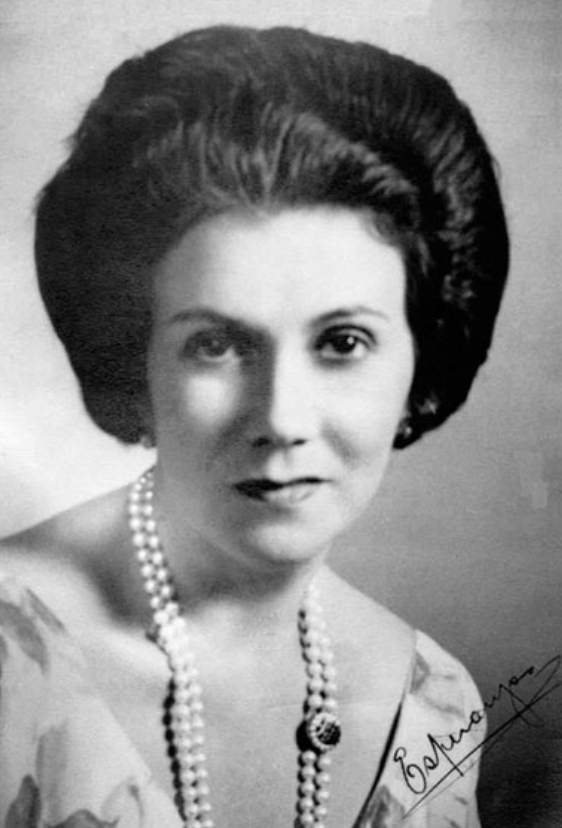Esperanza Matheus y Yerovi (Guayaquil, March 2, 1917 – December 1, 2006) was a distinguished Ecuadorian linguist, academic, writer, and cultural advocate. Among her notable works were “Mito y Mística del Siete,” “Ecuatorianismos de Costa y Sierra,” and “César Andrade y Cordero: Vida y Obra.” Her commitment to advancing culture was recognized with significant honors, including her election as a member of the Ecuadorian Academy of Language in 1980, where she delivered an impactful speech titled “La Participación de la Mujer Ecuatoriana en la Creación de la Cultura del País” (The Participation of Ecuadorian Women in the Creation of the Country’s Culture). Additionally, she received the Lazo de Dama de la Orden del Mérito Civil from Francisco Franco and the Lazo de Dama de la Orden de Isabel la Católica, presented by Juan Carlos I of Spain. Esperanza Matheus y Yerovi’s contributions to Ecuador’s cultural and literary landscape remain an enduring testament to her legacy.
Introduction
Esperanza Matheus y Yerovi, born on March 2, 1917, in Guayaquil, Ecuador, and passing away on December 1, 2006, was a distinguished linguist, academic, writer, and cultural advocate. Her life and work left an indelible mark on Ecuador’s literary and cultural landscape. This article delves into her fascinating life, accomplishments, and her significant contributions to Ecuador’s cultural heritage.
Early Life and Family
Esperanza Matheus y Yerovi’s roots were firmly embedded in Guayaquil. She was born to Carlos Matheus Pacheco, who served as the President of the Congress and briefly as the head of the executive branch, and his second wife and niece, Isabel María Yerovi Matheus. Her upbringing was in the heart of the city, at the family residence located at the intersection of Malecón and Aguirre.
At a young age, Esperanza displayed a sensitivity that was beyond her years. During a visit to Los Angeles with her family at the age of two, she was brought to see Charlie Chaplin at a local zoo. However, she was not as enamored with his work as the other children and confessed that his movies made her cry. Chaplin himself noted her sensitivity and advised her father not to expose her to his films, recognizing that she understood their deeper emotional nuances.
Her early education was under the guidance of her mother, who taught her to read and play the piano. She began her formal schooling at the Colegio de las Salesianas in Luque and Escobedo, and in 1925, at the age of eight, she made her first communion.
Cultural Engagement
Esperanza’s life took a significant turn with the passing of her father in 1928. Her mother devoted herself to raising her and overseeing the construction of the Guayaquil Cathedral, which Esperanza affectionately referred to as “my stone sister.” Between 1929 and 1932, she attended boarding school in Quito, although her studies were interrupted by the Guerra de los Cuatro Días (War of the Four Days).
During this period, she actively participated in cultural programs and contributed to teaching at the Workers’ Centers of Instruction. In 1949, she played a pivotal role in founding the Center for Hispanic Culture in Guayaquil, where she became one of its most distinguished members. In 1953, she was elected as the president of the Circle of Female Hispanic Culture, another organization she helped establish.
As her career progressed, Esperanza Matheus y Yerovi undertook extensive research and authored several notable works, including “Mito y Mística del Siete” and “Ecuatorianismos de Costa y Sierra.” She explored the cultural and linguistic heritage of Ecuador and penned novels like “Rocío,” “Controversias del Corazón,” “Margarita,” “Dos Besos,” and “Un Ensayo como Prólogo para un Sueño: Beatriz Pacheco.” Her contributions to literature and cultural studies enriched Ecuador’s intellectual landscape.
Legacy and Honors
Esperanza Matheus y Yerovi’s dedication and contributions to her country’s culture did not go unnoticed. In 1980, she was elected as a member of the Ecuadorian Academy of Language, representing the Real Academia Española. Her inaugural speech, titled “La Participación de la Mujer Ecuatoriana en la Creación de la Cultura del País” (The Participation of Ecuadorian Women in the Creation of the Country’s Culture), marked her commitment to advancing gender equality in cultural spheres.
She also received honors from abroad, including the Lazo de Dama de la Orden del Mérito Civil from Francisco Franco and the Lazo de Dama de la Orden de Isabel la Católica, presented by Juan Carlos I of Spain.
Esperanza Matheus y Yerovi left a profound impact on Ecuadorian culture and literature, and her legacy continues to inspire scholars, writers, and cultural advocates to this day. Her dedication to preserving and celebrating her country’s heritage serves as a testament to the enduring power of culture and the written word.
Works
- Mito y Mística del Siete
- Ecuatorianismos de Costa y Sierra
- César Andrade y Cordero: Vida y Obra
- Discurso para la Coronación del Dr. Luís Cordero Crespo
- La Poesía de José María Egas: El Bardo de Dios
- Las Lenguas Pre-Incaicas de las Costas del Reino de Kit-Us, hoy República del Ecuador
- El Siete Esotérico
- Rocío (costumbrista)
- Controversias del Corazón
- Margarita
- Dos Besos
- Un Ensayo como Prólogo para un Sueño: Beatriz Pacheco

